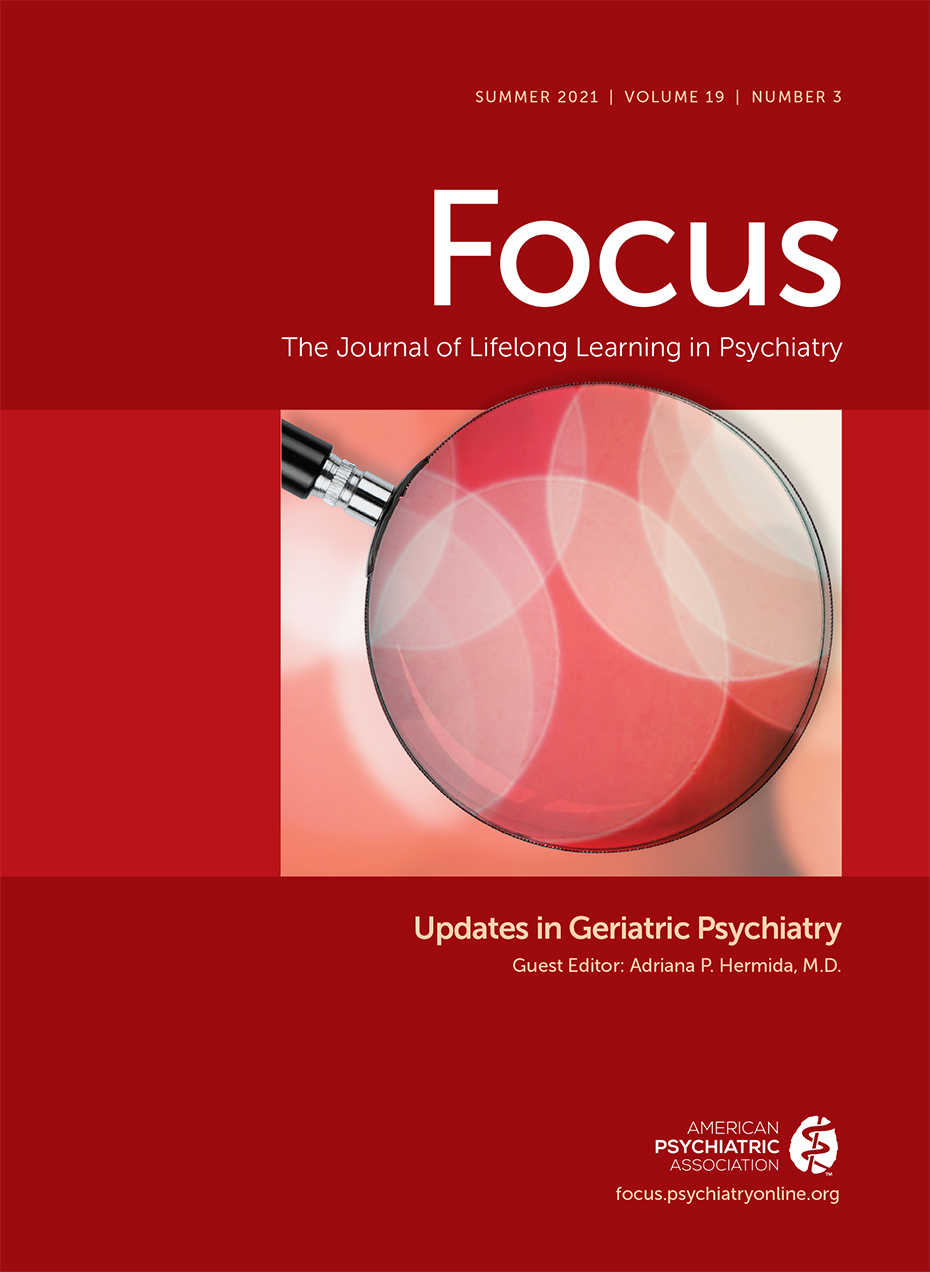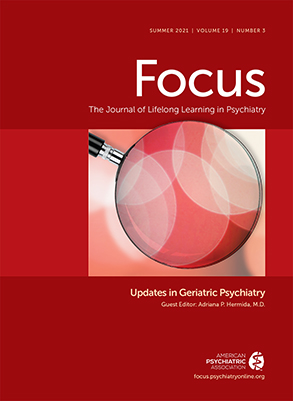In recent years, there has been a reemergence in the effort to recognize and identify the complex diagnosis of dementia syndrome of depression (DSD). The diagnosis does not have proposed criteria and is not mentioned in
DSM-5, even though neuropsychological changes mimicking dementia in older patients with depression have been long recognized. In the 1880s, melancholic dementia was identified by Mairet, and in 1961, Kiloh coined the term, “pseudo-dementia,” in an article that outlined cases of patients with affective disorders and apparent dementia (
1). Yet, more than 50 years later, this syndrome is frequently misdiagnosed and inappropriately treated. The field might reconsider its attempts to cast aside the notion of pseudodementia, because not all patients with cognitive impairment and depression have an unrelenting course of further cognitive decline. DSD is certainly a complicated entity, because depressive symptoms are sometimes associated with or precede a dementia syndrome (
2). Therefore, considerable clinical overlap can exist between the two diagnoses. The objective of this article is to discuss the difficulties in accurately diagnosing and treating this syndrome, as illustrated below in our reported case.
Case
Mr. A is a 60-year-old Caucasian man, with a remote psychiatric history of depression, who presented originally to the emergency department (ED) for confusion, decreased functionality, psychomotor retardation, and difficulty with activities of daily living (ADLs) for the previous 6 months. Three years prior, his wife had noted a gradual decompensation in his functional ability. She described inappropriate behaviors, such as lying down in the middle of a golf course, becoming acutely agitated, making inappropriate comments in a public speech, and isolating himself from the family—all of which were highly uncharacteristic of him. One year prior, the patient had taken on a new executive position out of state, after which he quickly decompensated. He lost 40 pounds, was living in unhygienic conditions, and was not attending to his ADLs. His wife also witnessed changes in his personality, describing him as more passive and amotivated. In the few months prior to the ED visit, Mr. A’s wife had noted that he appeared more confused, was unable to participate in conversation, was clumsier in his actions, and had difficulties with his balance. She also noticed that he had become apathetic and needed to be instructed to keep up with his ADLs.
At the original interview, Mr. A described difficulty with concentration, short-term memory, formulating thoughts, and writing sentences. He endorsed feeling “overwhelmed” with his job, describing it as “doom and gloom.” He reported neurovegetative symptoms of anhedonia, poor sleep, poor energy, guilty thoughts, poor concentration, poor appetite, apathy, and psychomotor retardation. He denied suicidal or homicidal ideation. Mr. A also endorsed symptoms of anxiety and paranoia: he believed the police were going to arrest him for insignificant actions and was worried about his computer being hacked and his wife being abducted. He denied auditory or visual hallucinations, as well as history of manic or hypomanic symptoms or recent substance use. His psychiatric history included being prescribed paroxetine by his primary care provider in 2000 for “anxiety.” He had taken paroxetine for a year and reported that it had been helpful. Mr. A’s family history included a maternal grandfather with Alzheimer’s disease; a mother with alcohol dependence, depression, anxiety, and some cognitive issues; and a father with substance dependence.
The patient underwent neurologic and psychiatric evaluation, and a differential diagnosis of frontotemporal dementia (FTD) versus major depressive disorder was made. There was a decision for further neurological work up. Mr. A was simultaneously started on sertraline, which was titrated to 200 mg per day. Laboratory testing included vitamins D, B12, a complete blood count, comprehensive metabolic panel, rapid plasma reagin (RPR), thyroid stimulating hormone (TSH), urine toxicology screen, and urinalysis—all were within normal limits. Computed tomography and magnetic resonance imaging (MRI) of the head, an electroencephalogram, and cerebrospinal fluid studies were also normal. On the Montreal Cognitive Assessment (MOCA), Mr. A’s score was 26 of 30, and neuropsychological testing identified impairments in executive function, attention, and memory. He was particularly slow in Trails A and B and demonstrated an increased score on global deficit. Over the next few months, Mr. A’s symptoms worsened. His family began to consider options, such as nursing home placement, because of the possibility of FTD and its poor prognostic course. Mr. A became significantly more abulic and eventually was admitted to the psychiatric inpatient unit due to the risk of self-harm. Pharmacological intervention was recognized as insufficient, because of the severity of the patient’s symptoms. Electroconvulsive therapy (ECT) was recommended. After educating Mr. A and his family, a course of ultrabrief right unilateral ECT was initiated. After two treatments, Mr. A was found to be more sociable, participating in group therapy, and more organized in his thoughts. Over the next few weeks, he received a total of seven ultrabrief right unilateral treatment with minimal cognitive side effects. The patient’s family and providers noted dramatic improvement in his mood as well as organization of thoughts. On follow up, Mr. A’s cognitive function was back to baseline, and his mood was much improved. He remained in remission with no deterioration in his cognition, normal neuropsychological test results, and a MOCA score of 30 out of 30. Two years after his full remission with the acute course of ECT and continued pharmacotherapy, he took on a new executive position and gave an inspiring speech in front of 350 individuals in which he gave a testimony of his effective treatment.
Discussion
In 1978, Drs. McHugh and Folstein attempted to rename pseudodementia as dementia syndrome of depression, which they felt was more descriptive of the syndrome (
3). This attempt was followed in 1981 by Dr. Caine’s proposed diagnostic criteria for pseudodementia, which included intellectual impairment with a primary psychiatric disorder, features of impairment similar to those seen in central nervous system disorders, cognitive deficits that are reversible, and lack of a known neurological condition to account for the presentation (
4). Yet, none of the versions of the
DSM have ever included DSD as a singular disorder. This exclusion from the
DSM may be due to the lack of consistent evidence demonstrating that DSD and NCD are two clearly separate disorders, but instead that DSD is “forme fruste” of NCD. Meta-analyses of the literature have suggested that history of depression is a risk factor for dementia (
5) and for Alzheimer’s disease in particular (
6). However, if DSD and NCD are treated as if on a continuum, those suffering from DSD are not appropriately diagnosed or treated, resulting in a greater morbidity.
It is well documented that depressive disorders frequently cause mild cognitive deficits, which show up in psychometric testing (
7). In late life, however, the relationship between depression and dementia becomes increasingly complicated, given the significant symptomatic overlap, including loss of interest, apathy, difficulty making decisions, agitation, irritability, and changes in sleep and appetite (
2). This symptom overlap results in a diagnostic and treatment dilemma that may manifest in delayed treatment of profound depression resulting in persistent major functional impairment (
8). The difficulties specific to the geriatric population with DSD have been identified as memory loss, attention deficits, initiation problems, and word-finding difficulties.
Fortunately, variations exist between DSD and NCD that clinicians can use to guide their diagnostic assessments. Specific studies have demonstrated that late-life depression can present with deficits of episodic memory and learning (
9). However, performances on implicit memory tasks and other memory functions may be spared (
10–
12). It has been proposed that difficulties with motivation, effort, and arousal are linked to the performance of effort-demanding cognitive operations among depressed patients (
13). Furthermore, when engaged in effort-demanding exercises, patients with depression fared worse than those with a primary diagnosis of NCD (
13). It has also been suggested that these deficits represent attention problems rather than a lack of ability caused by structural deficits (
2). Finally, executive function impairment, specifically task switching or set-shifting ability, is distinctly more impaired among patients with depression versus those with Alzheimer’s dementia (
14). These features can be used by clinicians to guide diagnoses. Therefore, in terms of psychometric testing, this syndrome can objectively be separated from a pure NCD with memory impairment that would result in gradual decline regardless of intervention in affective symptoms. This differentiation is often missed in primary care settings or in settings where late-life depression is treated as a prelude to impending Alzheimer’s disease, because there is evidence suggesting that depression may occur as a prodrome for Alzheimer’s dementia (
7). However, there is evidence to support that treatment of late-life depression with a combined antidepressant and memantine treatment for patients with depression and cognitive impairment is associated with improved cognition and a low rate of conversion to dementia (
15). Therefore, it is essential to validate DSD and to search for depressive syndromes even when cognitive symptoms have presented first.
Late-life depression is frequently associated with cognitive impairment, and the frequent overlap of symptoms makes it quite challenging to discern one from the other. Although there is evidence in neuropsychological testing, there are limited neurochemical or neuroimaging biomarkers for the etiological classification of dementia versus DSD. There is a plethora of evidence suggesting that late-life depression is a prodrome to impending dementia. Some proposed mechanisms supporting the development of depression into dementia include depression being an emotional response to the awareness of cognitive deficits, expressions of the same underlying process that causes the dementia, cholinergic system disruptions, prolonged hypercortisolemia, as well as depletion of cognitive reserve (
16). Studies (
17,
18) have demonstrated that patients with Alzheimer’s disease are more likely to have a history of major depression. Hippocampal atrophy has also been identified on MRI of older adults with depression (
19). An interesting autopsy study (
20) has shown increased plaques and tangles of patients who had Alzheimer’s disease and lifelong depression. One theory is that prolonged depression resulting in persistent hypercortisolemia may cause hippocampal damage, which does not necessarily cause dementia, but increases susceptibility to its development (
16).
Further studies are needed to determine whether adequate treatment of depression associated with cognitive symptoms in mid or late life may help to maintain cognitive function and delay onset of a major NCD. This topic is quite relevant given the anticipated increase in dementia prevalence during the next few decades.

